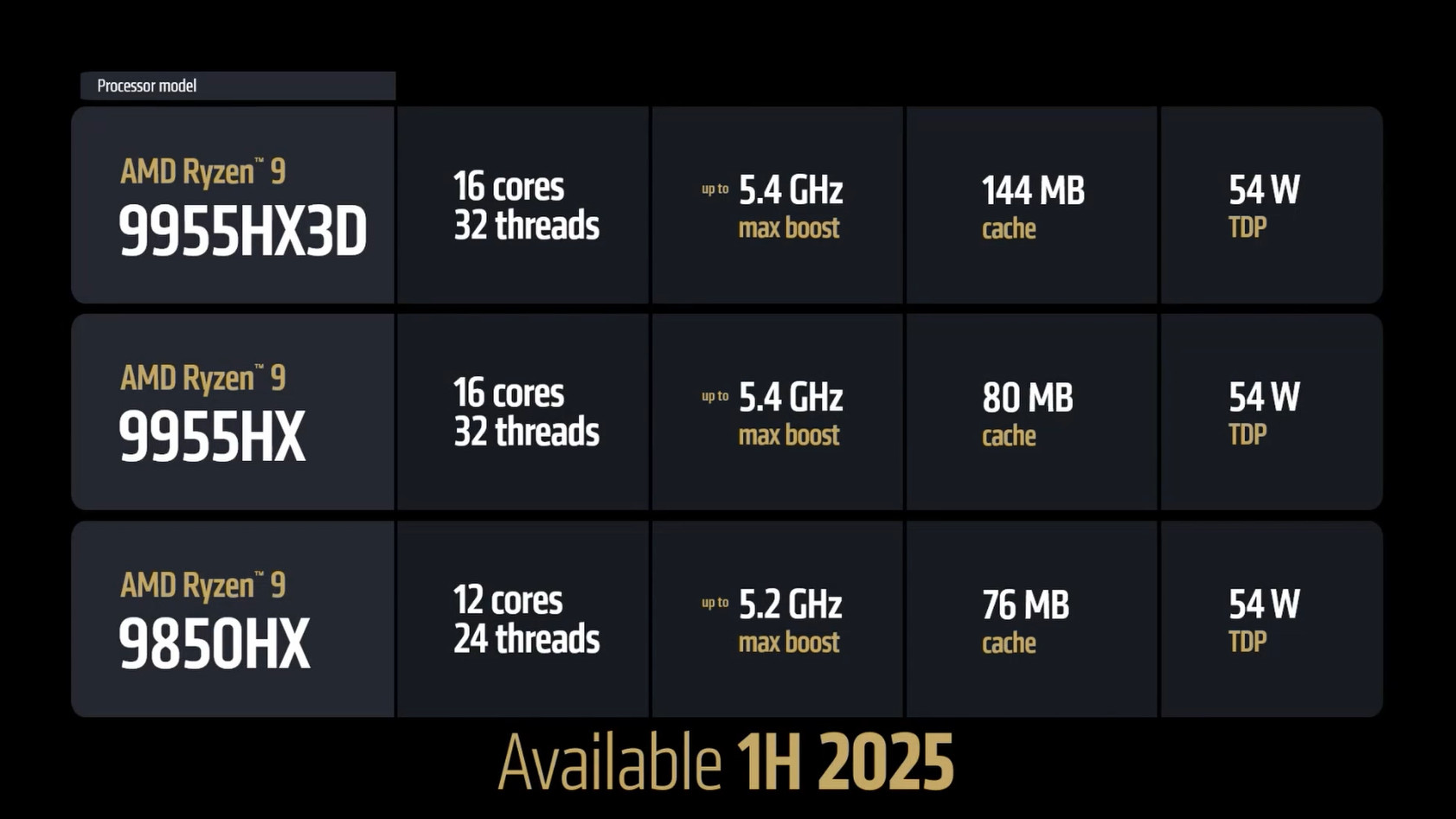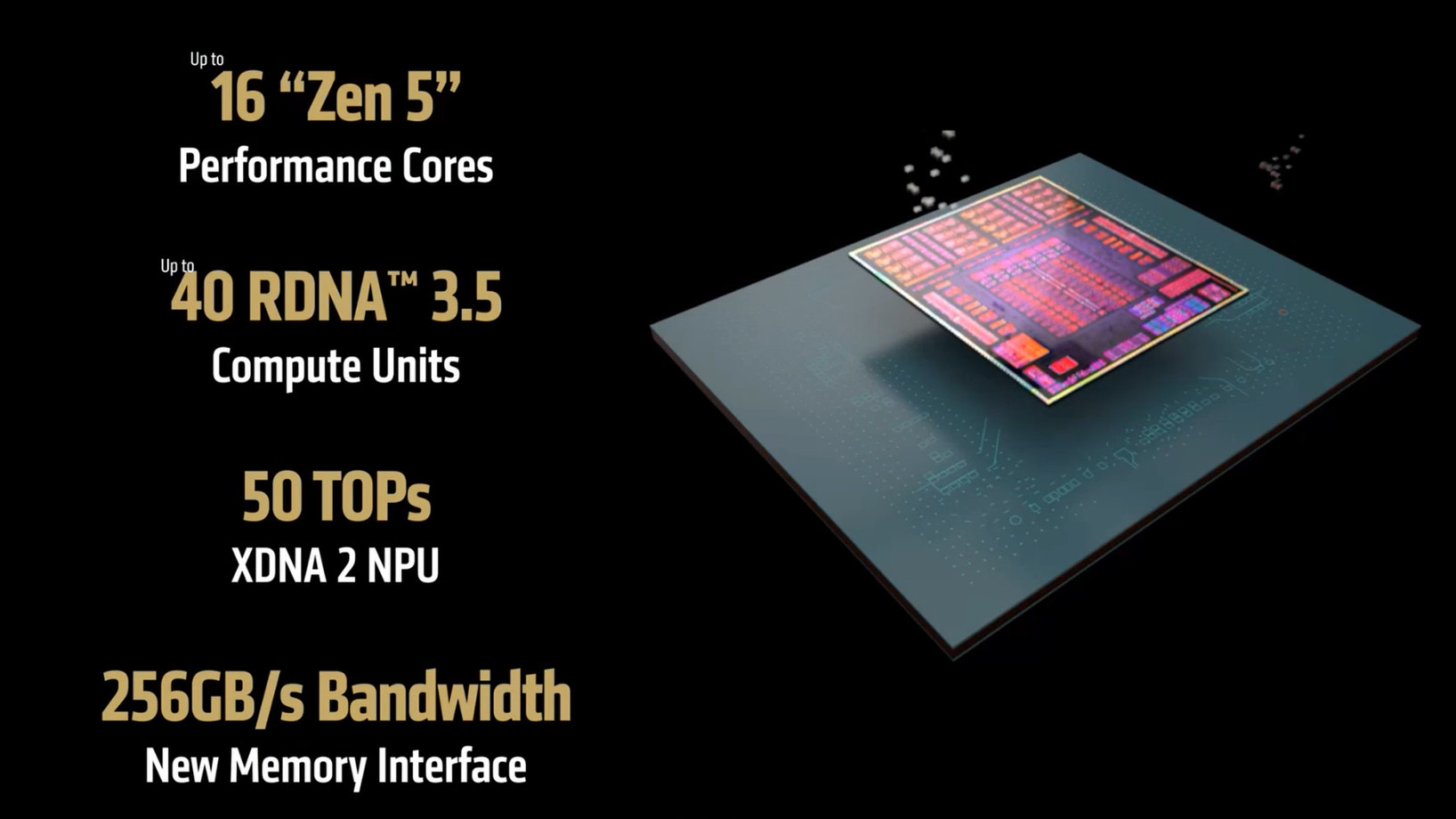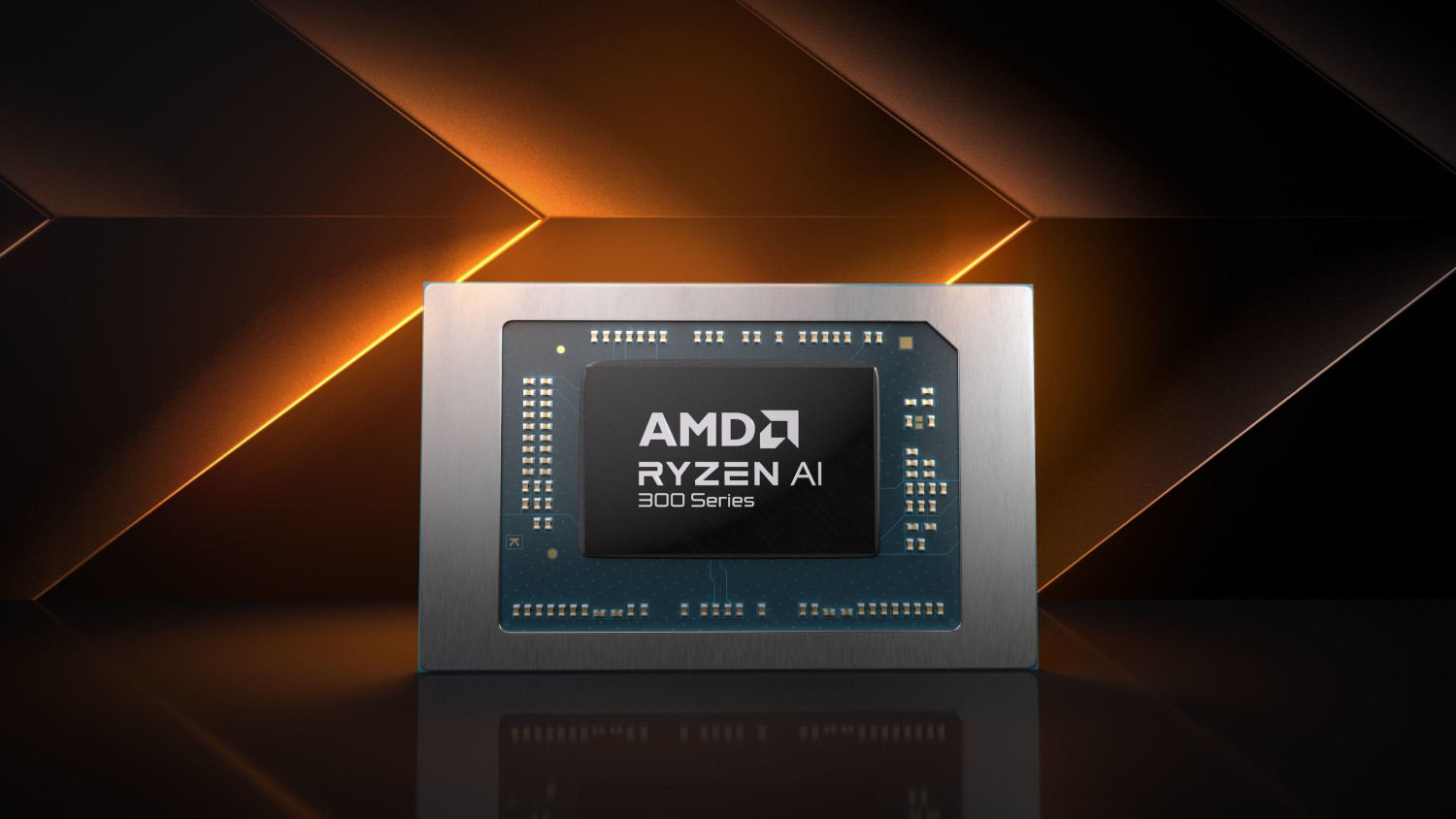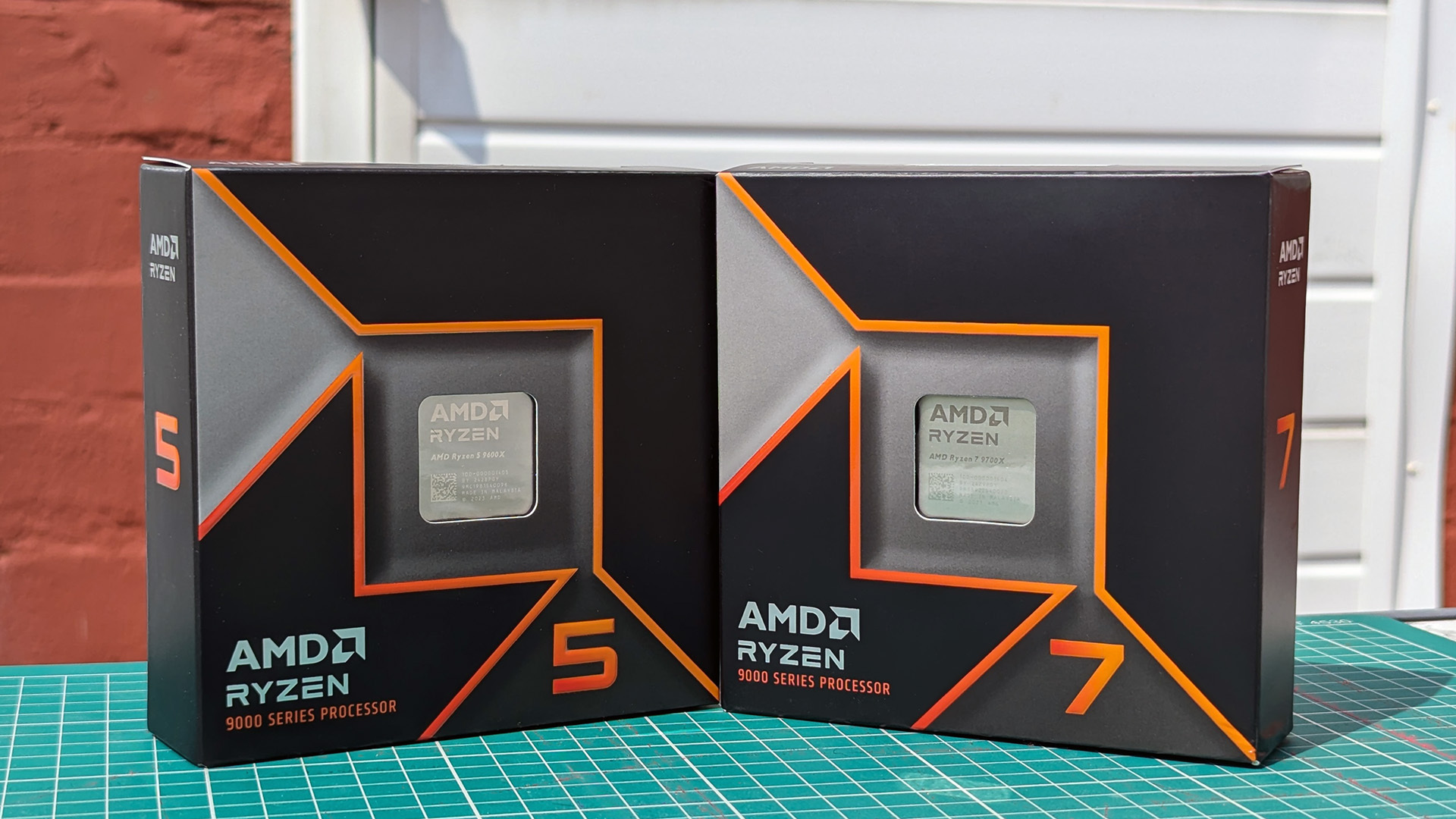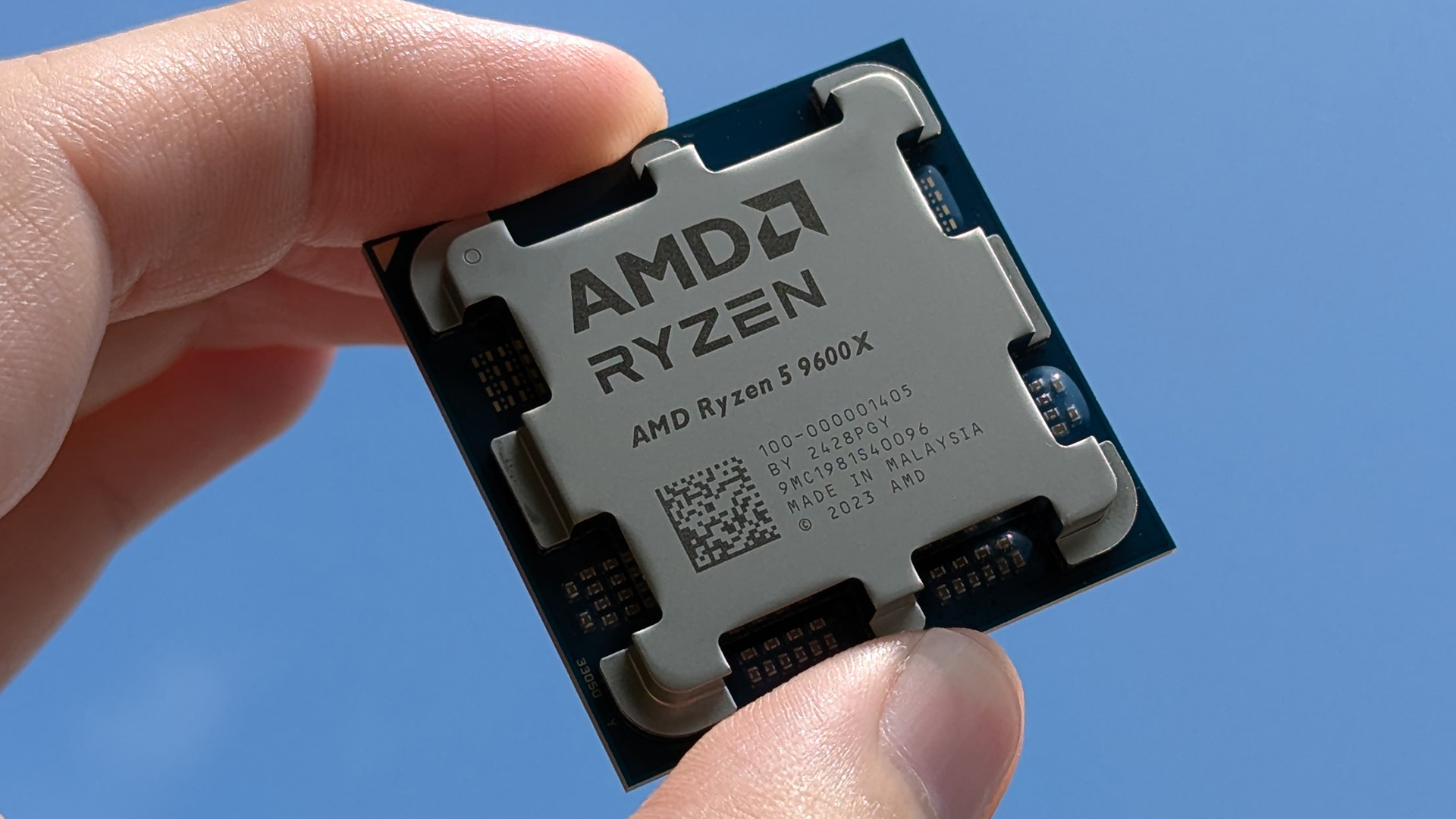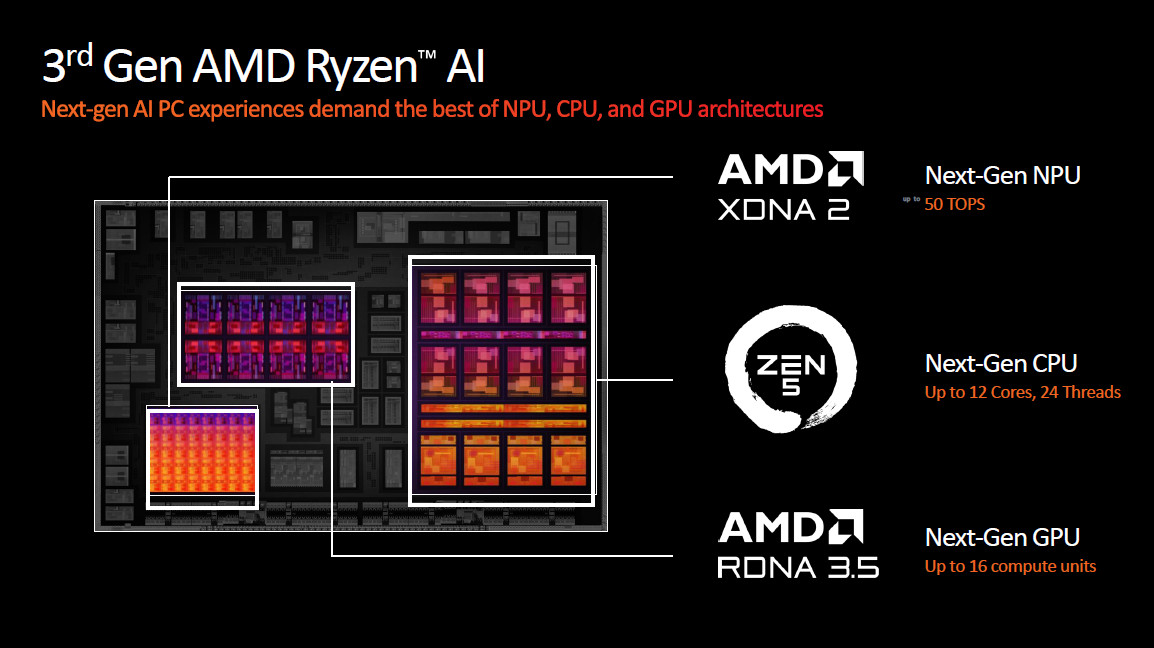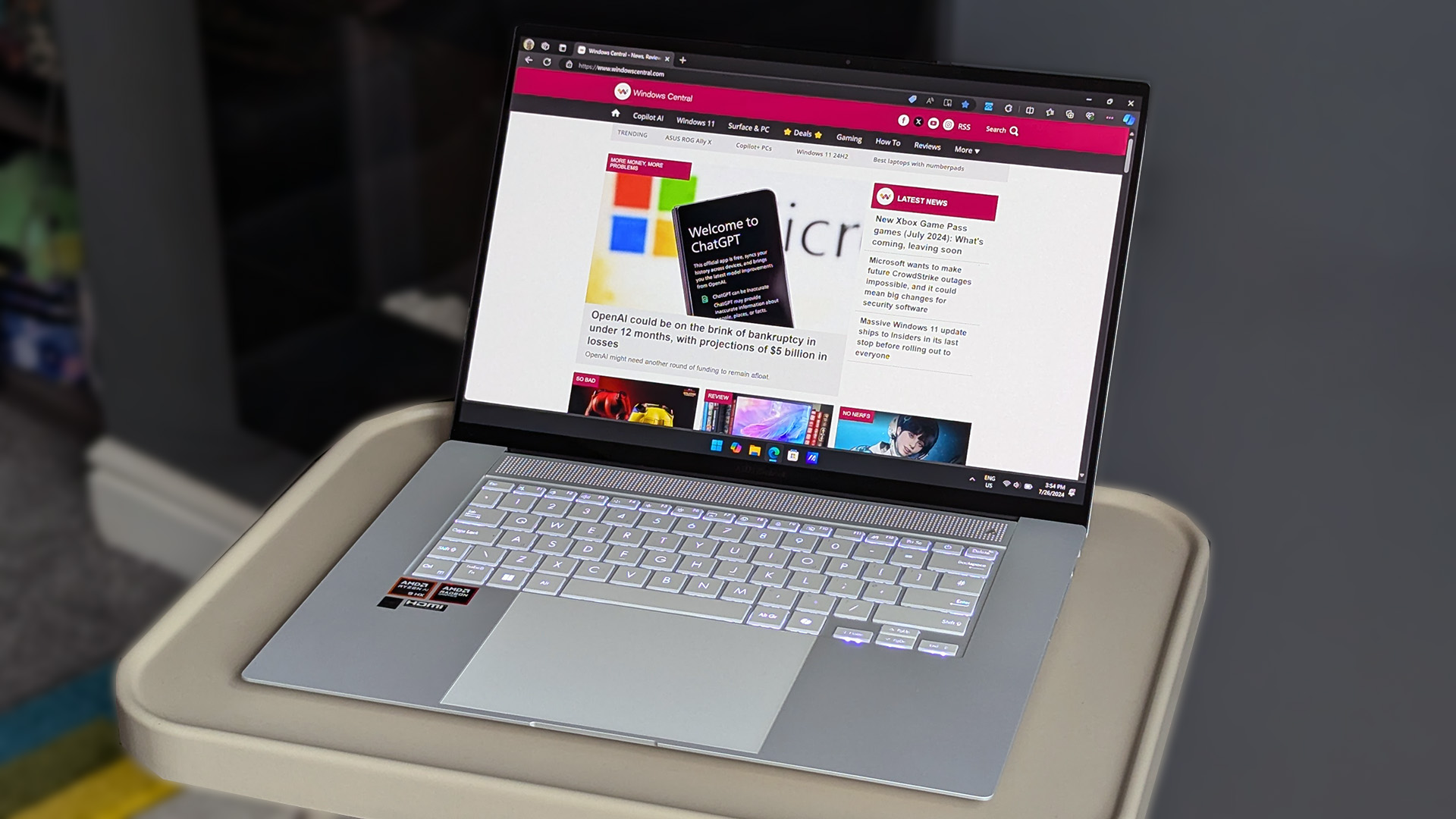AMD's Zen 5 CPU platform is set to get a lot bigger in 2025
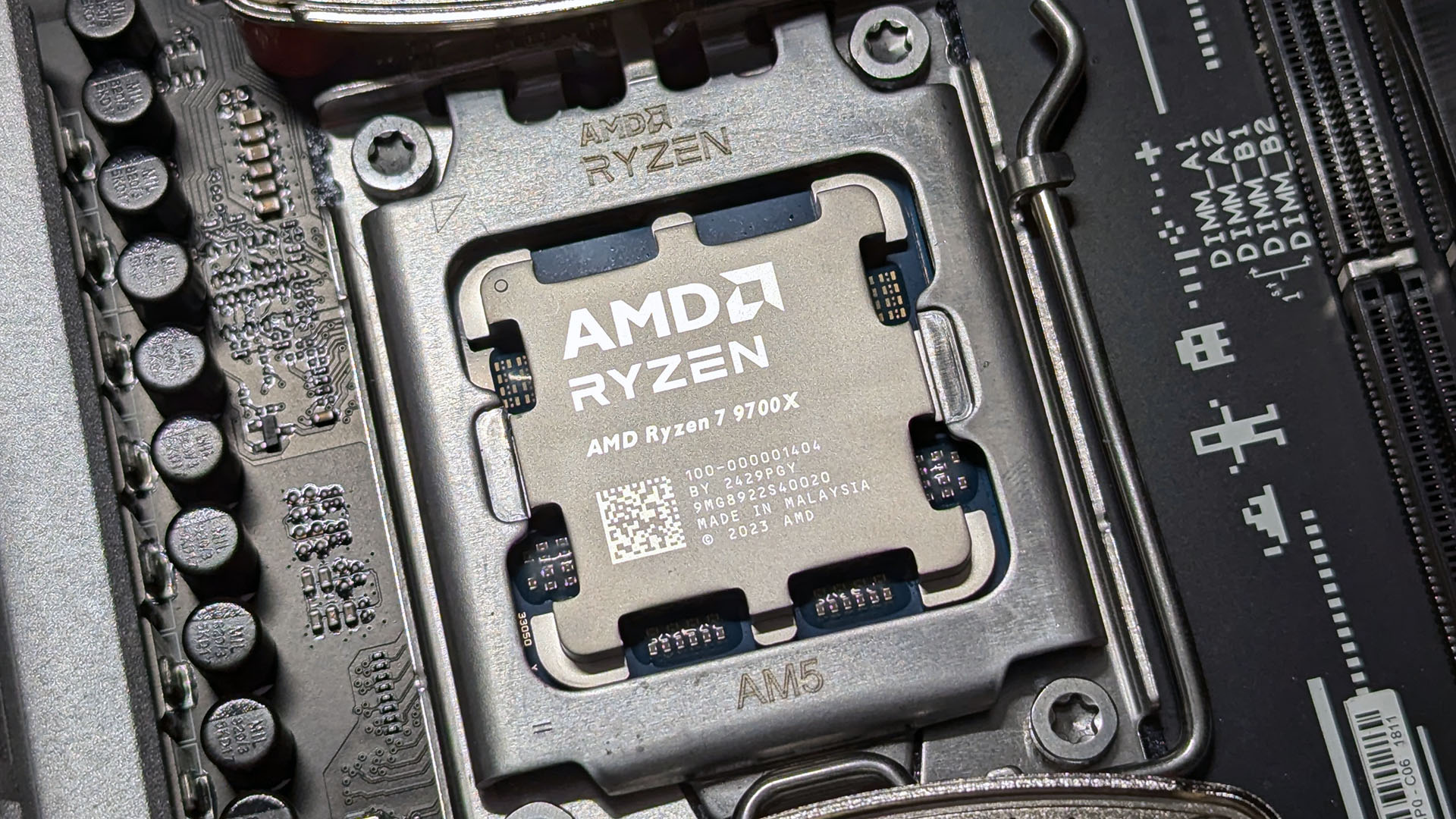
AMD officially revealed its next-gen “Zen 5” processors (CPU) at Computex 2024 in Taipei, Taiwan. The company took a two-pronged approach to its initial unveiling, with Ryzen AI 300 mobile chips for laptops and Ryzen 9000 desktop chips for PC builders interested in gaming, creation, and beyond. These chips are now widely available.
More importantly for PC gamers, the company has unveiled a few of its Ryzen 9000X3D CPUs. The Ryzen 7 9800X3D launched first on November 15, 2024, and it's now expected to be joined by Ryzen 9 X3D siblings following a CES 2025 announcement.
AMD also bolstered its mobile CPU lineup with the announcements of "Fire Range" HX/3D chips for gaming, AMD Ryzen AI 5 and 7 chips for mid-range Copilot+ PCs, and AMD Ryzen AI Max chips for premium Copilot+ PCs. Here's where AMD's Zen 5 landscape stands in 2025.
January 14, 2024: I've added a bunch of new information coming out of CES 2025, including news about Ryzen 9 X3D and Ryzen AI 300. — Cale Hunt
What's new with AMD's Zen 5 CPUs?
AMD used its opportunity at CES 2025 to go big on Zen 5 processor news. The major announcement is the new Ryzen 9 9950X3D desktop CPU that AMD claims is "the world's best processor for gamers and creators." It was revealed alongside the Ryzen 9 9900X3D.
AMD's claim rides heavily on the back of its exclusive 3D V-Cache technology. AMD stacks the CPU's cache vertically on the die rather than around the die, which allows for increased cache space and lower latency. The cache is what the CPU uses for fast, frequent, and temporary storage, and the unique design significantly boosts performance in games. Part of the Zen 5 architecture redesign moved the cache below the CPU's cores, allowing the cooler to be more effective where it's needed most.
While the Ryzen 7 9800X3D focuses primarily on gaming with its stacked cache, AMD has added a secondary cache to its new Ryzen 9 X3D CPUs. The max-frequency unstacked cache benefits creative work.
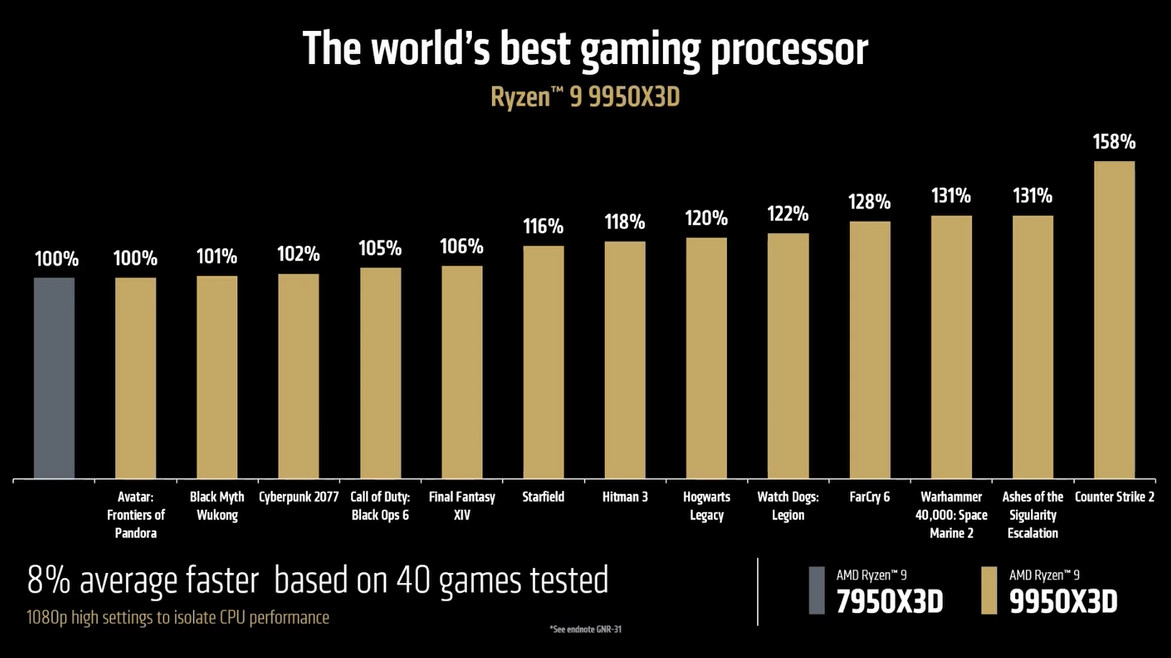
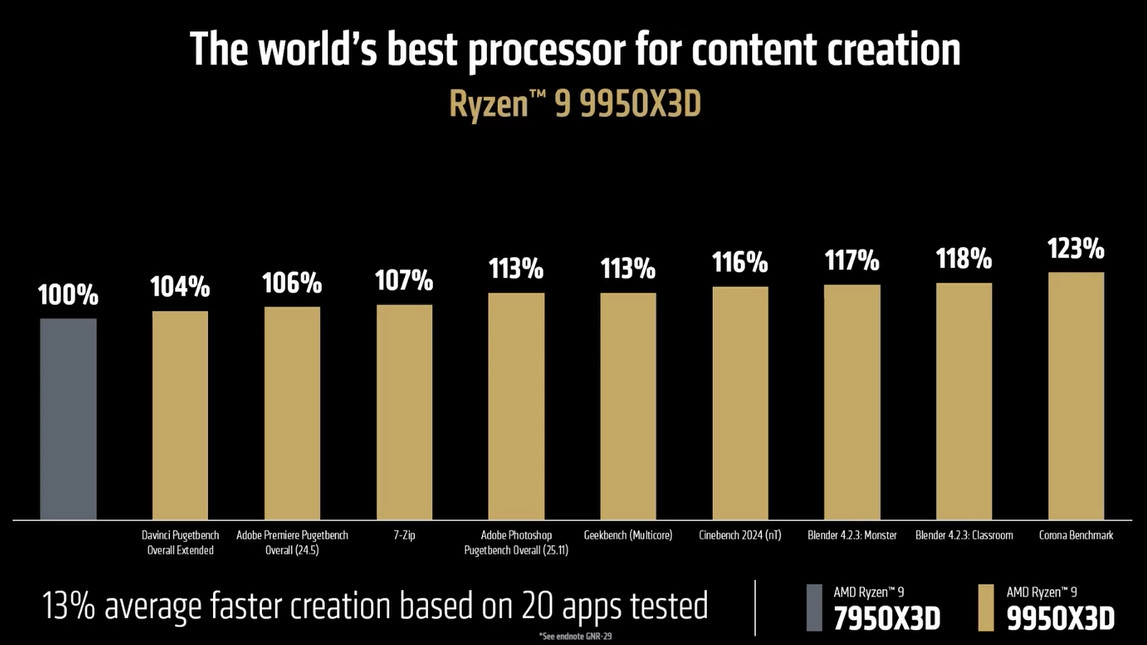
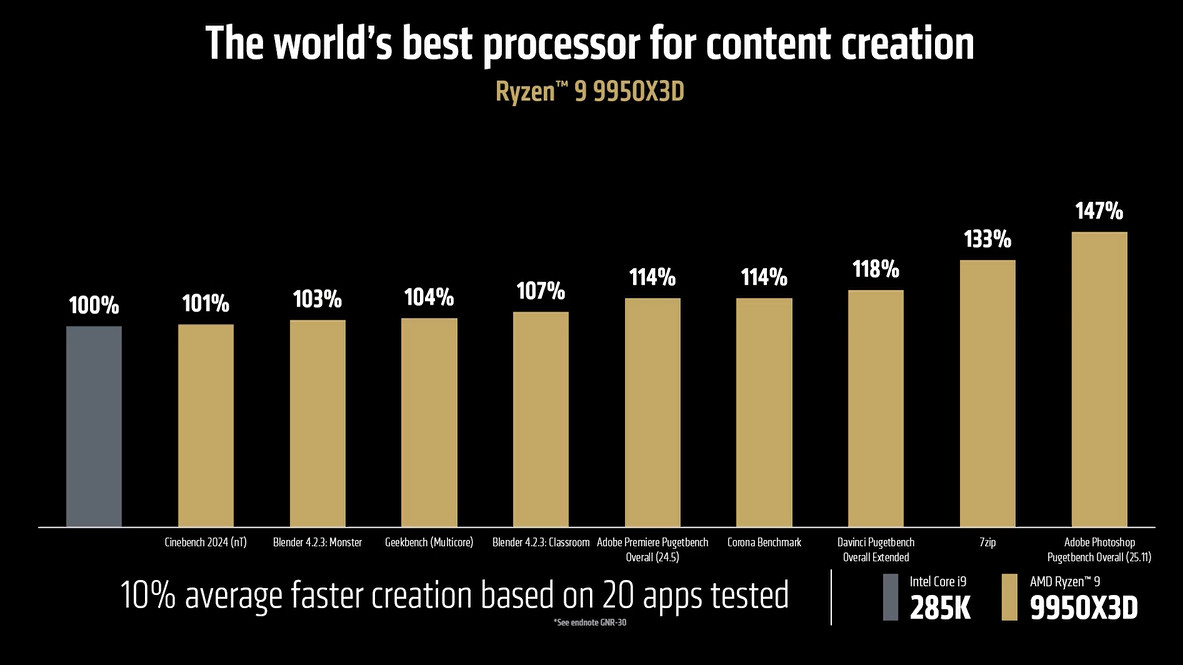
AMD focused on the Ryzen 9 9950X3D in its showcase. It's claiming that you can expect an 8% average increase in 1080p gaming performance compared to the Ryzen 9 7950X3D predecessor, as well as a 13% increase in creative apps compared to the same Zen 4 chip. Compared to the Intel Core Ultra 9 285K, AMD says you can expect a 10% average increase in creative apps.
All the latest news, reviews, and guides for Windows and Xbox diehards.
Furthermore, AMD says that gaming performance from the Ryzen 9 9950X3D compared to the Ryzen 7 9800X3D announced late last year is within 1%, so gamers who don't go in for creative work shouldn't be worried.
Here's a look at the Zen 5 Ryzen X3D lineup as it stands in the wake of CES 2025.
| Header Cell - Column 0 | AMD Ryzen 9 9950X3D | AMD Ryzen 9 9900X3D | AMD Ryzen 7 9800X3D |
|---|---|---|---|
Architecture | Zen 5 | Zen 5 | Zen 5 |
Cores | 16 | 12 | 8 |
Threads | 32 | 24 | 16 |
L1 Cache | 1,280KB | 960KB | 640KB |
L2 Cache | 16MB | 12MB | 8MB |
L3 Cache | 128MB | 128MB | 96MB |
Socket | AM5 | AM5 | AM5 |
TDP | 170W | 120W | 120W |
Base clock | 4.3GHz | 4.4GHz | 4.7GHz |
Max boost | 5.7GHz | 5.5GHz | 5.2GHz |
Overclockable? | ✅ | ✅ | ✅ |
There's not yet any pricing available for these new Ryzen 9 X3D CPUs. AMD has stated that it expects the Ryzen 9 9950X3D and 9900X3D to launch in Q1 2025.
3D V-Cache is headed back to mobile CPUs
While the desktop Ryzen 9 9950X3D CPU stole a lot of attention, AMD slid in a new mobile chip using 3D V-Cache.
AMD claims that its new Ryzen 9 9955HX3D "Fire Range" mobile CPU is "the world's best gaming and content creation mobile processor," coming at you with 16 cores, a 5.4GHz boost frequency, 144MB cache (with the 3D stacked tech) and a 54W TDP.
It's joined by the Ryzen 9 9955HX and the Ryzen 9 9850HX, each lacking 3D V-Cache that makes them better suited for a focus on creativity. All three of these CPUs are expected to launch in the first half of 2025.
AMD debuts new Zen 5 mobile CPUs at CES 2025
AMD's time at CES 2025 held a lot of new mobile chips, with the most powerful coming out of the Zen 5 era. While the Ryzen AI 9 300 mobile CPUs were announced in 2024 — I have an explanation below — AMD has bolstered the lineup with new Ryzen AI 7, Ryzen AI 5, and a "Halo" series known as AMD Ryzen AI Max.
AMD made some bold claims about its new Ryzen AI 300 Max series, going so far as to say that the flagship Ryzen AI Max+ 395 CPU is faster than an RTX 4090 when it comes to some AI workloads. Whether it's true or not, AMD's redesigned memory interface that allows for up to 96GB of system RAM to be used on the integrated GPU (with 256GB/s bandwidth) is the main driver behind these claims.
Here's a look at the lineup of AMD Ryzen AI Max mobile CPUs expected to launch in the first half of 2025.
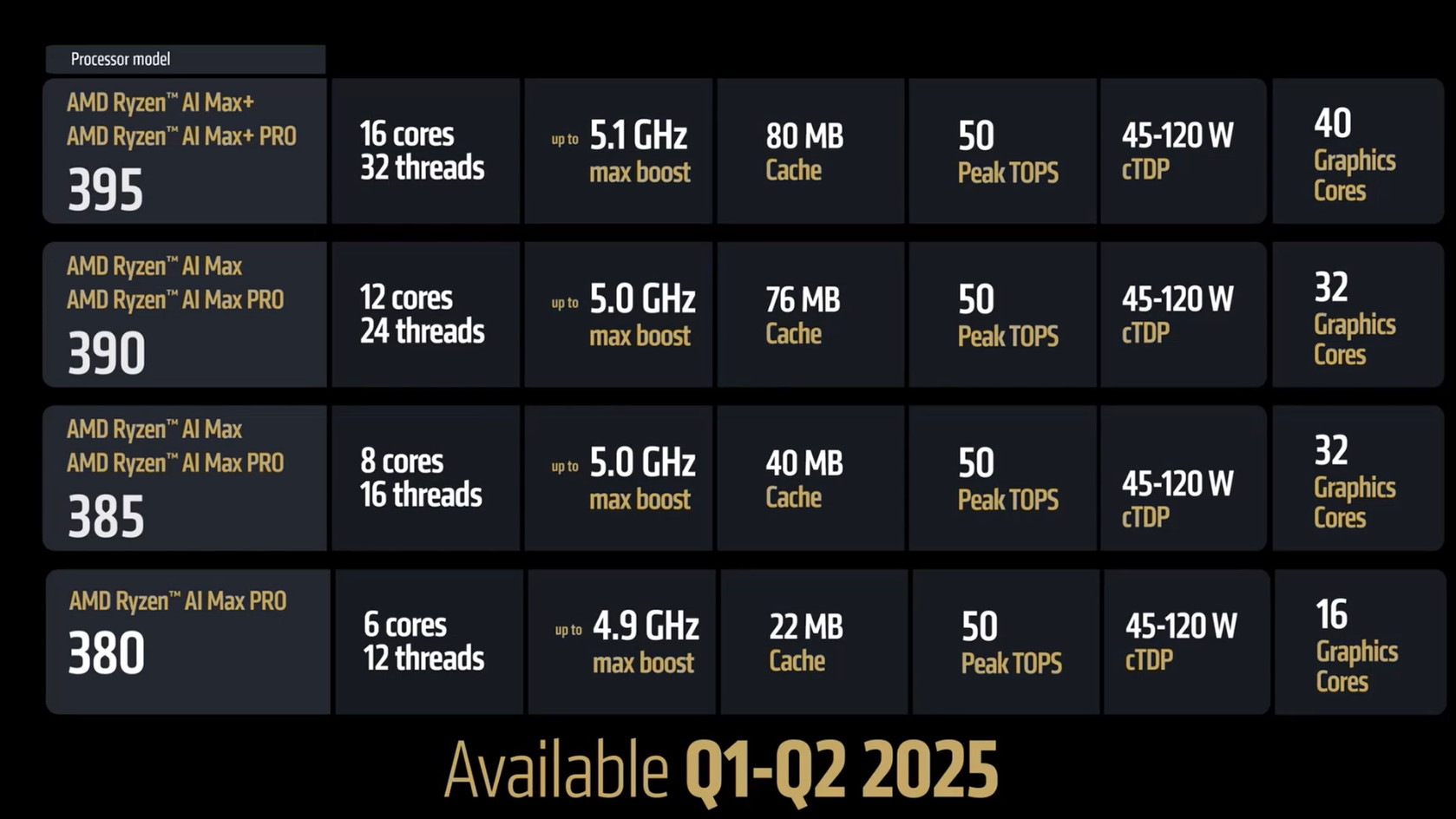
AMD did not stop there. Also coming to the Zen 5 party are new AMD Ryzen AI 7 and AI 5 mobile CPUs. These are intended for more affordable PCs, and the PRO variants will slot nicely into business laptops. Here's a look at the lineup.
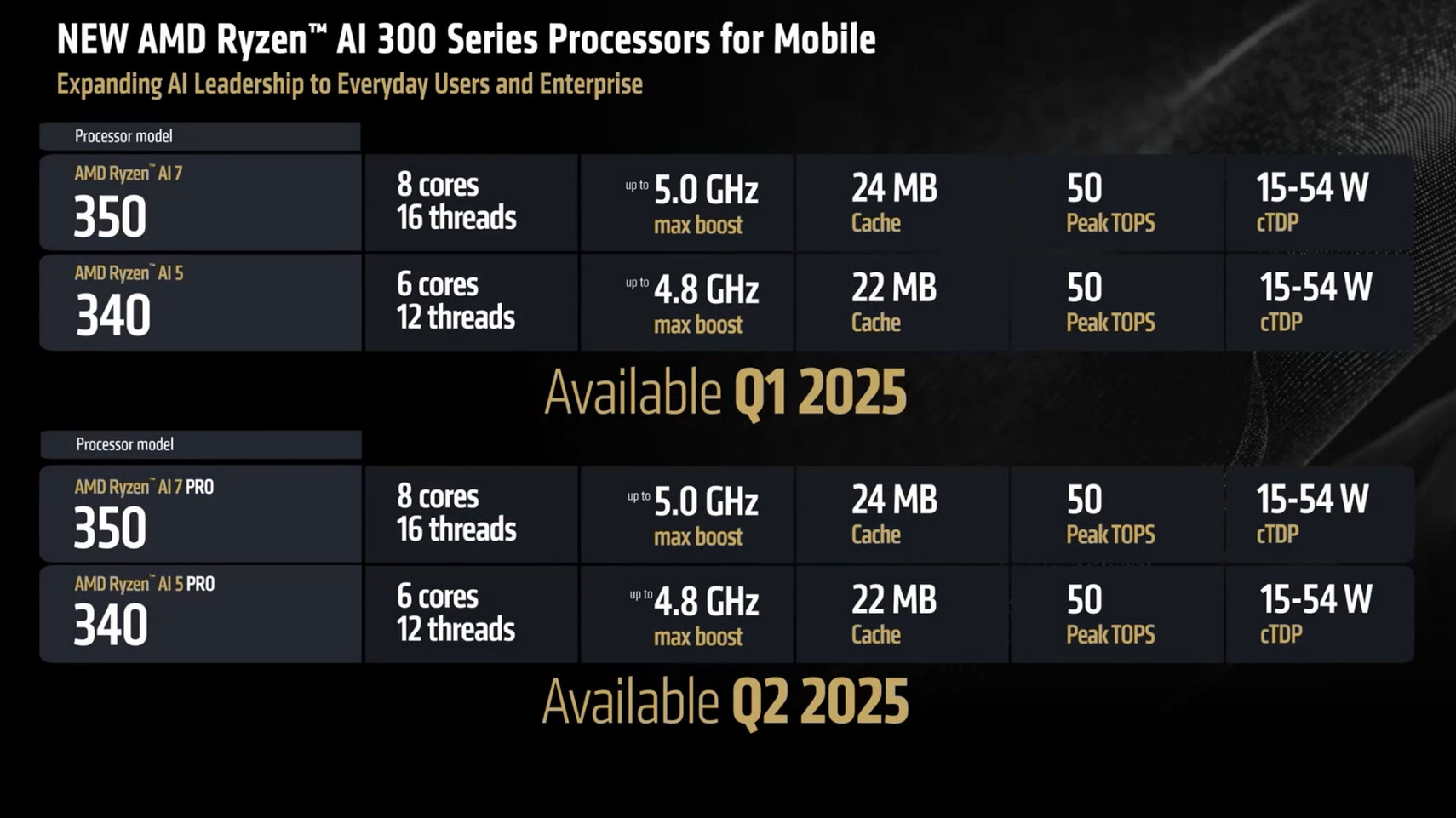
These new mobile Zen 5 CPUs are expected to arrive in laptops in the first half of 2025. The non-PRO models come first, with the business-minded chips arriving later.
AMD reveals the Ryzen 7 9800X3D in October 2024
AMD confirmed that the Ryzen 7 9800X3D is its next flagship gaming CPU in a video posted on October 31, 2024. It has 8 cores, 16 threads, a 5.2GHz boost clock, and 104MB of total cache space. Its base frequency is 500MHz faster than the Ryzen 7 7800X3D, pushing it to 4.7GHz.
Also confirmed is the 9800X3D's ability to be overclocked. Ryzen 7000X3D could technically be overclocked with some extra legwork and tools, but the process should be much easier with the Zen 5 chip.
AMD is promising an 8% average performance uplift (tested in more than 40 popular games) for the 9800X3D compared to the 7800X3D. AMD also took the fight to Intel's latest Core Ultra 9 285K desktop chip, claiming on average a 20% performance in the 40+ games tested. Intel focused a lot more on productivity with its latest chips, so this doesn't come as much of a surprise.
👀 Read our Intel Core Ultra 9 285K review
Furthermore, some extra info about the second-gen 3D V-Cache has been revealed. As was rumored, AMD moved the L3 cache to be closer to the core complex die (CCD), allowing for enough of a cooling improvement to unlock for overclocking.
What is AMD Zen 5?
“Zen 5” represents AMD's next-generation desktop and mobile processors. It’s the name of the architecture used for Ryzen 9000 and Ryzen AI 300 chips, bringing a number of improvements over last-gen “Zen 4” hardware.
As was rumored in the lead-up to AMD’s official announcement, Ryzen 9000 desktop CPUs offer up to 16% better instructions-per-clock (IPC) as well as more cache. They use the AM5 socket just the same as Zen 4 chips, and AMD says it plans on supporting the chipset “through 2027 and beyond.” That's good news for builders who hate upgrading every couple of years.
New X870E and X870 chipsets for AM5 motherboards were unveiled, sporting support for PCIe 5.0, DDR5 memory, USB4 connectivity, and Wi-Fi 7 wireless internet. They're now widely available, with more affordable B850 and B840 boards expected to launch in 2025.
AMD Ryzen 9000 desktop CPUs
AMD showed off four new Ryzen 9000 desktop CPUs at Computex 2024, including Ryzen 5, Ryzen 7, and Ryzen 9 options. The Ryzen 7 9700X, like its Zen 4 Ryzen 7 7700X predecessor, has eight cores and 16 threads. The Zen 5 chip has 40MB of cache (compared to 32MB), as well as a slightly higher 5.5GHz boost frequency. It runs at a 65W base TDP, which is impressive considering the Ryzen 7 7700X sits at a 105W default TDP.
The flagship Ryzen 9 9950X also brings a larger cache compared to its Zen 4 predecessor. However, it runs at a similar 170W TDP with a 5.7GHz boost clock compared to the Ryzen 9 7950X.
Here’s a look at the specs that make up the chips.
| Header Cell - Column 0 | Cores/Threads | Base/Boost Freq. | Cache | TDP |
|---|---|---|---|---|
AMD Ryzen 9 9950X | 16 / 32 | 4.3GHz / 5.7GHz | 80MB | 170W |
AMD Ryzen 9 9900X | 12 / 24 | 4.4GHz / 5.6GHz | 76MB | 120W |
AMD Ryzen 7 9700X | 8 / 16 | 3.8GHz / 5.5GHz | 40MB | 65W |
AMD Ryzen 5 9600X | 6 / 12 | 3.9GHz / 5.4GHz | 38MB | 65W |
AMD's Ryzen 9000 CPUs suffered a short delay due to a mislabeling issue, but it quickly fixed its mistakes and launched the Ryzen 5 9600X and Ryzen 7 9700X on August 8, 2024 (about a week after the delayed original launch date). The Ryzen 9 9900X and Ryzen 9 9950X launched on August 15.
Just three months later, AMD entered the market with its Ryzen 7 9800X3D gaming processor, which immediately sold out everywhere and continues to be hard to find at a reasonable price in January 2025. Revealed at CES 2025 were a couple of new Ryzen 9 X3D CPUs, which are expected to launch in Q1 2025.
AMD Ryzen 9000 review highlights and benchmarks
Windows Central Senior Editor Ben Wilson got his hands on the Ryzen 5 and Ryzen 7 chips to test and review, coming out with favorable results in both cases.
In his Ryzen 7 9700X review, in which he awarded it a Windows Central Best Award, Wilson remarked:
"AMD is delivering a multi-punch knockout with the Ryzen 7 9700X, as it drops the MSRP from its previous-generation 7700X and even returns to the 65W power draw of its 5700X. It comes with caveats, and the generational multi-core improvements are barely worth mentioning. However, its single-core performance is a thing to behold, ranking above most of Intel's comparable chips at 125W. Plus, it matches AMD's own gaming CPU champion, the Ryzen 7 7800X3D, while remaining cheaper and more power efficient — it's the new mid-range champion."
It looks like AMD took a safe approach to its Zen 5 desktop CPUs, with a focus on lowering the power draw and keeping the chips within a reasonable price range. The performance isn't wildly different, but there's a ton of room for overclocking. With Intel's 13th and 14th Gen chips suffering from instability and degradation issues caused by elevated voltages, one can only hope that AMD's desktop CPUs remain stable.
Wilson also reviewed the Ryzen 5 9600X; he wasn't as impressed with it as with the new Ryzen 7, but he handed it a Windows Central Recommended Award. Wilson said:
"In a masterclass of performance-per-watt efficiency, AMD offers incredible single-core performance scores that beat its intended 14600K rival and even challenge the 14700K. However, generational multi-core bumps are so minor that anyone running Ryzen 7000 chips or Intel 13th to 14th Gen won't see any real benefits. The 9600X is for entry-level builders starting with AM5, whether upgrading from much older platforms or starting from scratch; and even then, in-house competitors like the 7700X and 7800X3D will be more tempting to some crowds."
Here's a look at performance comparisons between the new Ryzen 9000 chips and their primary competition that we've also tested.
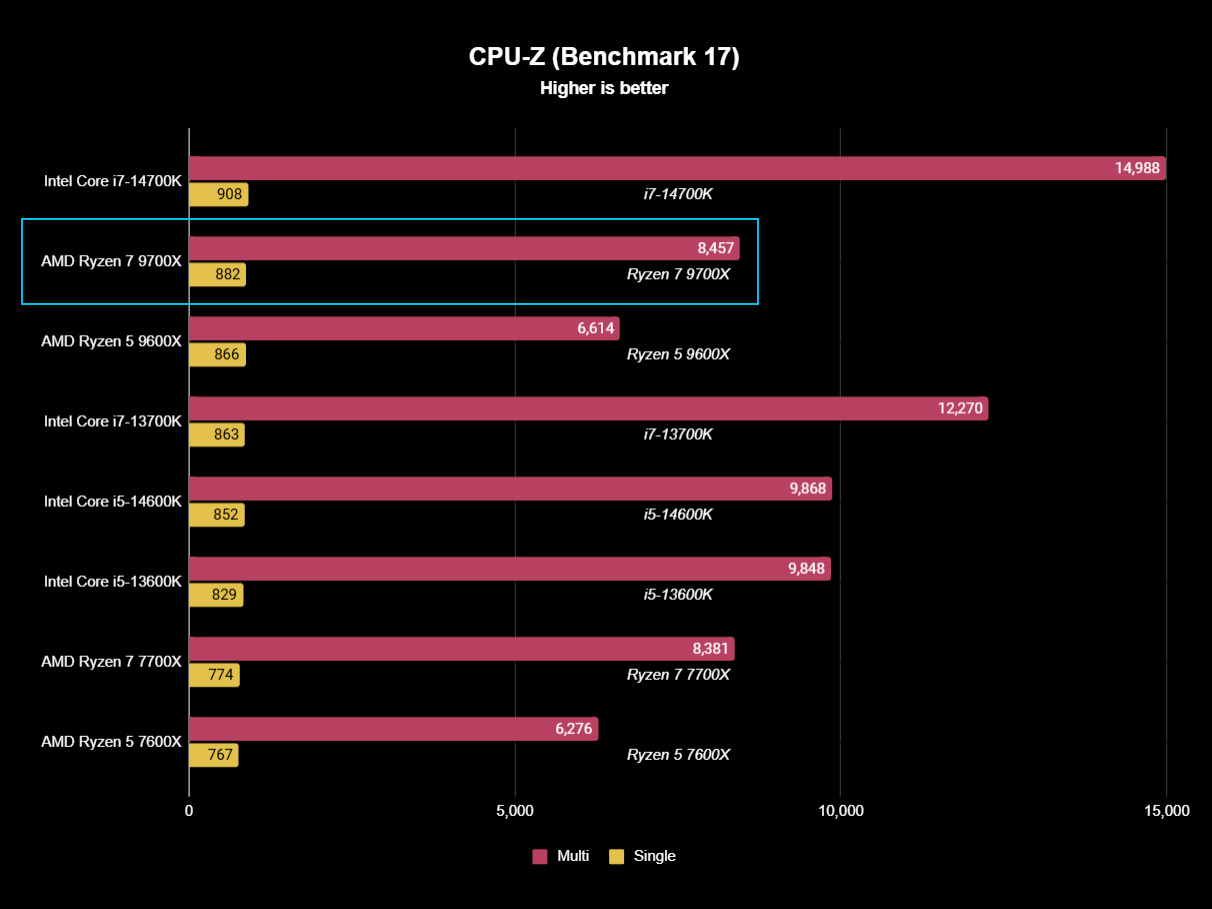
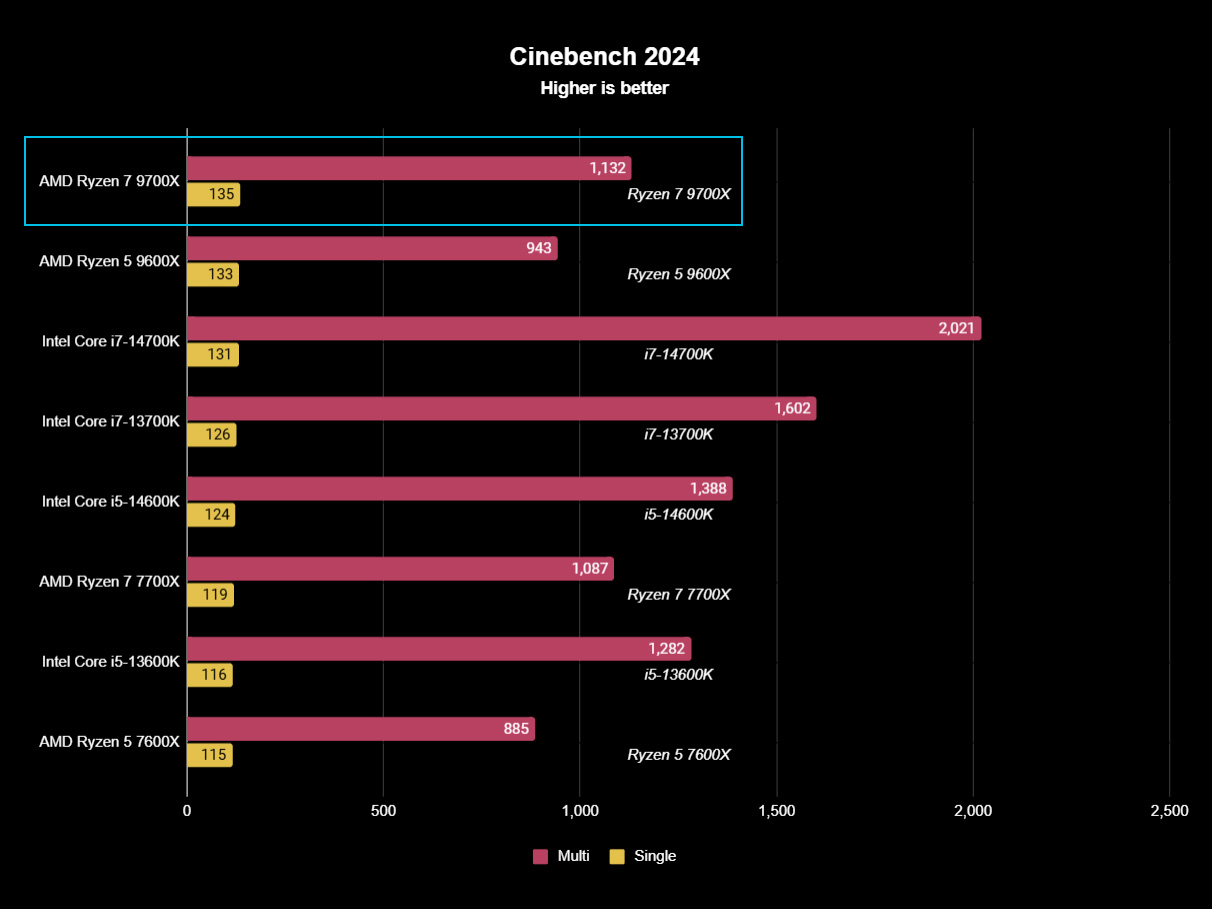
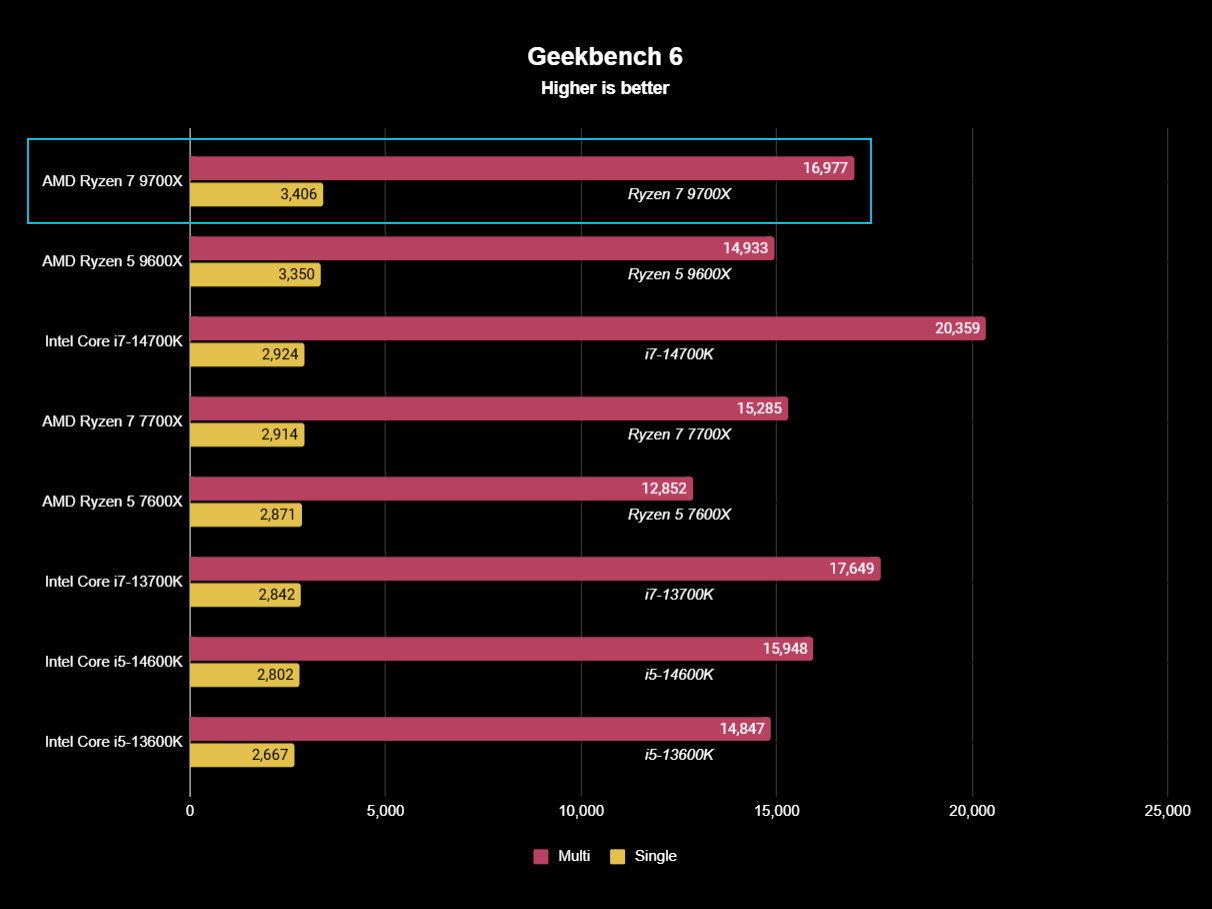
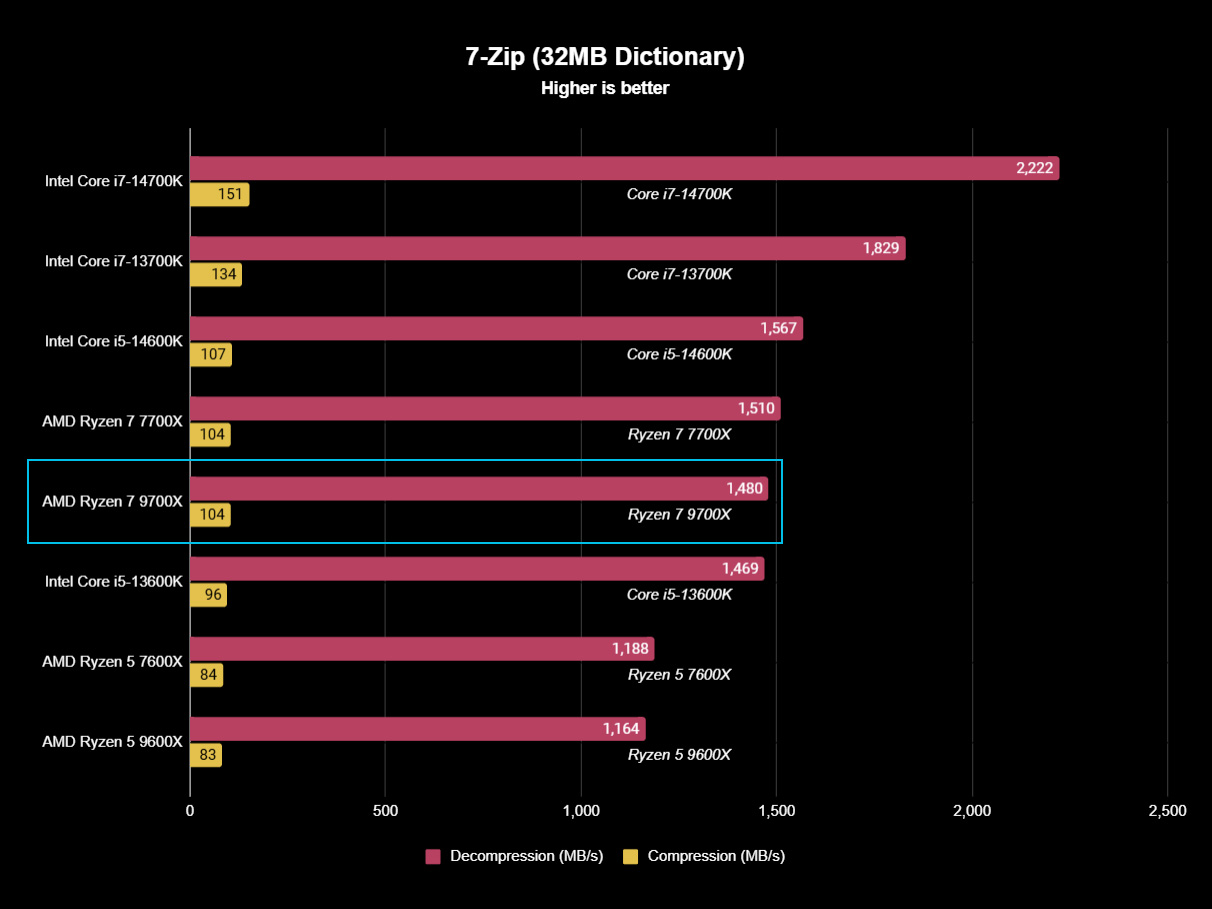
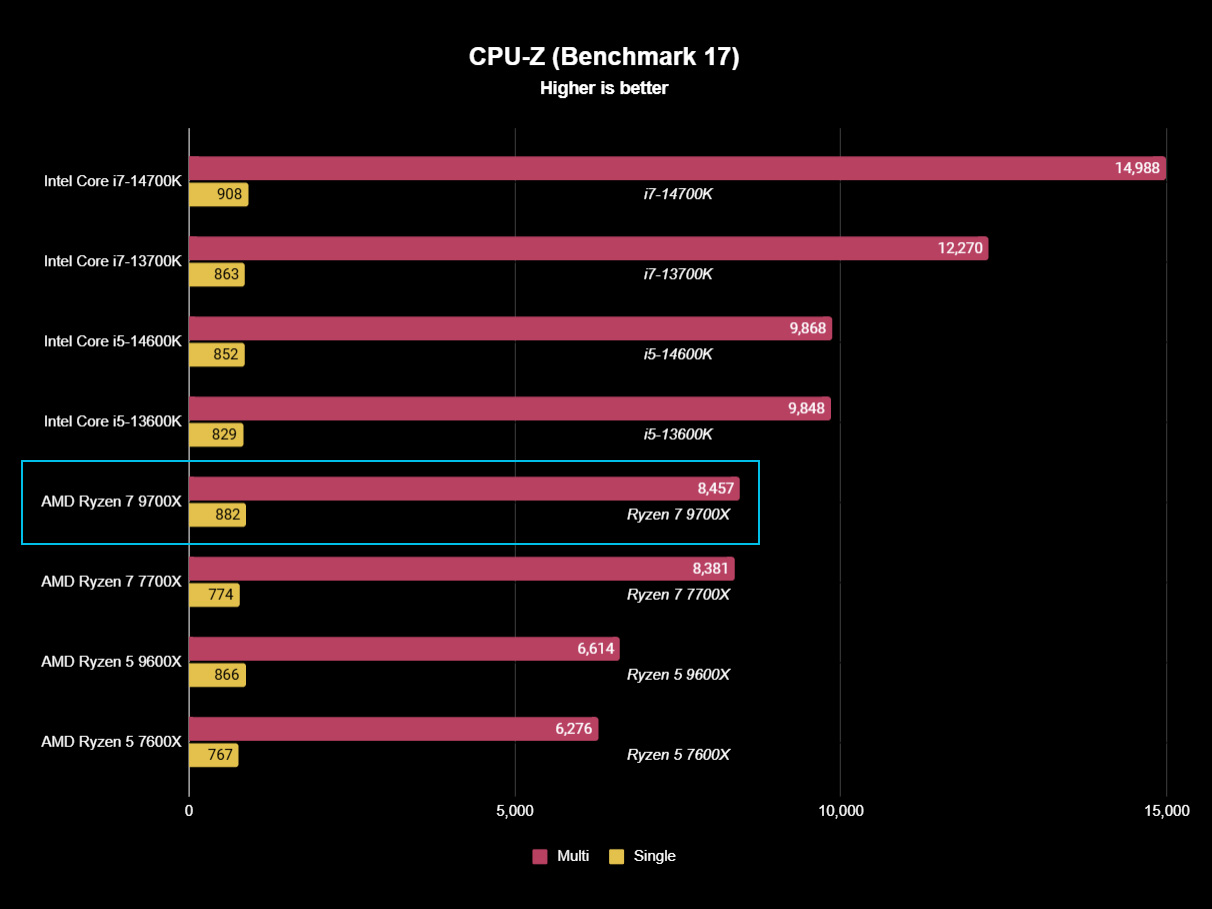
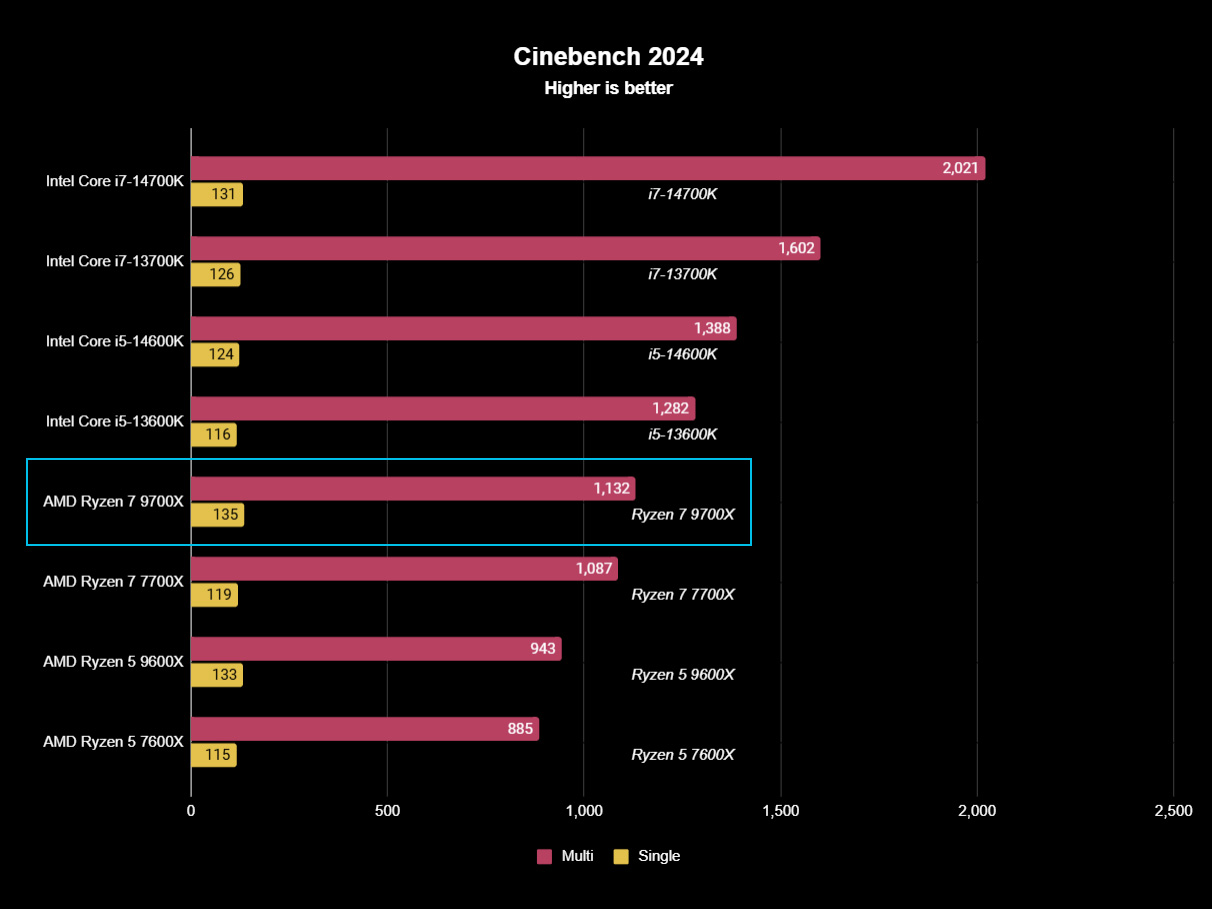
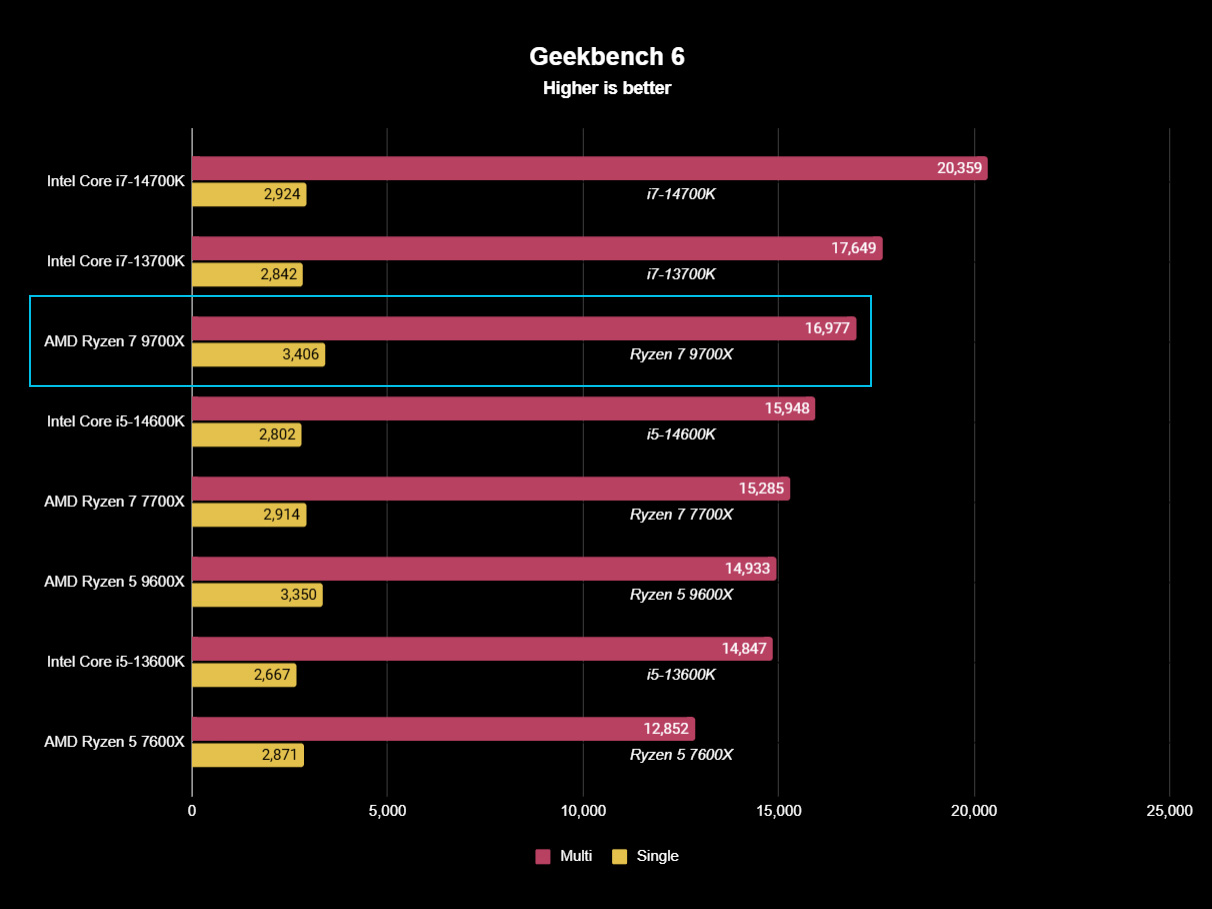
AMD's Ryzen 9 9900X and Ryzen 9 9950X CPUs launched on August 15, 2024, and Senior Editor Ben Wilson put them to the test in a joint Ryzen 9 9900X and 9950X review. Here's what he had to say:
"It's indisputable that the Ryzen 9 9950X is the world's most powerful consumer CPU, but it comes at a cost, both literally and through hardware requirements. You'll need a capable cooler to keep this 170W beast under control and performing its best, but it'll deliver the best metrics for creative apps. On the other hand, the 9900X stands up to Intel's 14th Gen Core i9-14900K at a lower cost, but both chips only make sense for those upgrading from much older hardware."
Finally, Wilson reviewed the AMD Ryzen 7 9800X3D, handing it a Windows Central Best Award and 4.5 (out of 5) stars. Its gaming performance proved unbested in Wilson's testing, and he came to this conclusion:
"Make no mistake: the Ryzen 7 9800X3D is the best gaming CPU, politely dethroning its predecessor as the new king of the hill as a cache-heavy monster. However, it's not winning any awards for productivity. It isn't worth installing into a PC that spends most of its time crunching numbers in Microsoft Office and Teams since the 9900X and 9950X dominate that category, but it's a far better pick for gamers than anything from Intel's modern productivity-centric offerings."
With AMD's latest Ryzen 9 X3D chips expected in Q1 2025, any creators who need extra performance for gaming AND creative apps now have improved CPU options.
AMD Ryzen 9000 pricing and availability
AMD launched its Ryzen 9000 desktop CPUs with a certain MSRP in mind, and in October 2024 it cut the prices of the non-X3D models. Here's what you can expect to pay as we settle into 2025, with the original MSRP and new lower prices included.
- The Ryzen 5 9600X has a
$279$250 MSRP that's $10 cheaper than its predecessor. You can usually find it for about $240. - The Ryzen 7 9700X currently costs about $350, which is slightly lower than the
$359$330 MSRP. - The Ryzen 9 9900X has a
$499$470 MSRP, but the lowest price I could find is around $410. - The Ryzen 9 9950X pushed the MSRP to
$649$600, but it's already usually available for around $590. - The Ryzen 7 9800X3D launched with a $479 MSRP, and that's now hard to find. Scalpers and price gougers have made the chip tough to find for a reasonable price. It currently sits at around $650.
- The new Ryzen 9 9950X3D and 9900X3D have yet to launch, and there's no word yet on pricing.
AMD Ryzen AI 300 laptop CPUs
The other side of AMD’s Zen 5 Computex announcement involves new Ryzen AI 300 chips for laptops. This is the “Strix Point” lineup of processors, with Zen 5 CPU cores, RDNA 3.5 GPU Compute Units (CU), and XDNA 2 NPU.
AMD lays claim to the “world’s most powerful NPU” with 50 TOPS of power for local AI acceleration, and that claim will stand for the foreseeable future. Qualcomm’s Snapdragon X Elite and Snapdragon X Plus chips hit 45 TOPS, while even Intel’s next-gen “Lunar Lake” chips are expected to have a 45 TOPS ceiling.
This is especially important for Copilot+ features in Windows 11, which require an NPU with at least 40 TOPS. Laptops with AMD’s Ryzen AI 300 chips will eventually receive access to the advanced AI features just like our favorite Copilot+ PCs; until then, the major benefits of Ryzen AI 300 appear to be all-day battery life and strong performance.
Here's a look at the two Ryzen AI 300 chips announced so far by AMD.
| Header Cell - Column 0 | Cores/Threads | Base/Boost Freq. | NPU TOPS | TDP/cTDP | Graphics |
|---|---|---|---|---|---|
AMD Ryzen AI 9 HX 370 | 12 / 24 | 2.0GHz / 5.1GHz | 50 | 28W / 15-54W | AMD Radeon 890M |
AMD Ryzen AI 9 365 | 10 / 20 | 2.0GHz / 5.0GHz | 50 | 28W / 15-54W | AMD Radeon 880M |
The two Ryzen AI 300 mobile chips feature the same NPU with 50 TOPS but otherwise different specs. The Ryzen AI 9 HX 370 is the flagship chip with 12 cores and 24 threads. AMD has split the cores between Zen 5 and Zen 5c, the latter being more efficient and slightly less powerful than the former. The Ryzen AI 9 HX 370 has a boost frequency up to 5.1GHz, a 28W TDP (configurable between 15W and 54W for manufacturers), and AMD Radeon 890M graphics.
The Ryzen AI 9 365 falls to 10 cores and 20 threads, with a 5.0GHz boost clock and the same TDP numbers. Its Radeon 880M GPU is slightly less powerful than the 890M due to it having four fewer CUs.
The ASUS Zenbook S 16 is the first laptop we tested with AMD's new chips
While ASUS is the first laptop manufacturer to get AMD's new Ryzen AI 300 chips into our hands, other big brands like Acer, HP, Lenovo, and MSI are also building AI laptops around the new CPUs.
Windows Central's Ben Wilson reviewed the ASUS Zenbook S 16 (UM5606) favorably, handing it a Recommended Award. Here's what he had to say concerning performance:
"As expected, the Ryzen AI 9 HX 370 sits comfortably between devices featuring Intel's Core Ultra 7 155H mobile processor in Geekbench 6, given that the Zenbook S 16 runs at the same 28W when its fan profile is set to 'Performance Mode' in the MyASUS companion app. It's exciting to see AMD pull ahead of Apple's M3 chip in a $1,999 14-inch MacBook Pro (16GB RAM) in multi-threaded performance, but single-core scores are still firmly in the macOS camp; not that many modern apps would utilize it."
Battery life is also stellar; Wilson said:
"If ASUS is using AMD's new processors to expand its place in the AI PC category, it needs to keep up with the extraordinary battery life offered by competing devices, including its own ARM-based Vivobook S 15. Qualcomm's Snapdragon X Elite chips boast a breakthrough in all-day battery life (and sometimes beyond) that eclipses more power-hungry x86-64 Ryzen chips. With that in mind, a 13-hour and 11-minute result from the 'Modern Office' battery drain benchmark in PC Mark 10 ranks among true "all day" devices, coming in only one hour behind the Vivbook S 15."
Coming at about $1,400 for a model with a Ryzen AI 9 365 CPU, 24GB of RAM, 1TB SSD, and 3K OLED touch display, ASUS is offering a lot of laptop at a competitive price.

Cale Hunt brings to Windows Central more than nine years of experience writing about laptops, PCs, accessories, games, and beyond. If it runs Windows or in some way complements the hardware, there’s a good chance he knows about it, has written about it, or is already busy testing it.

